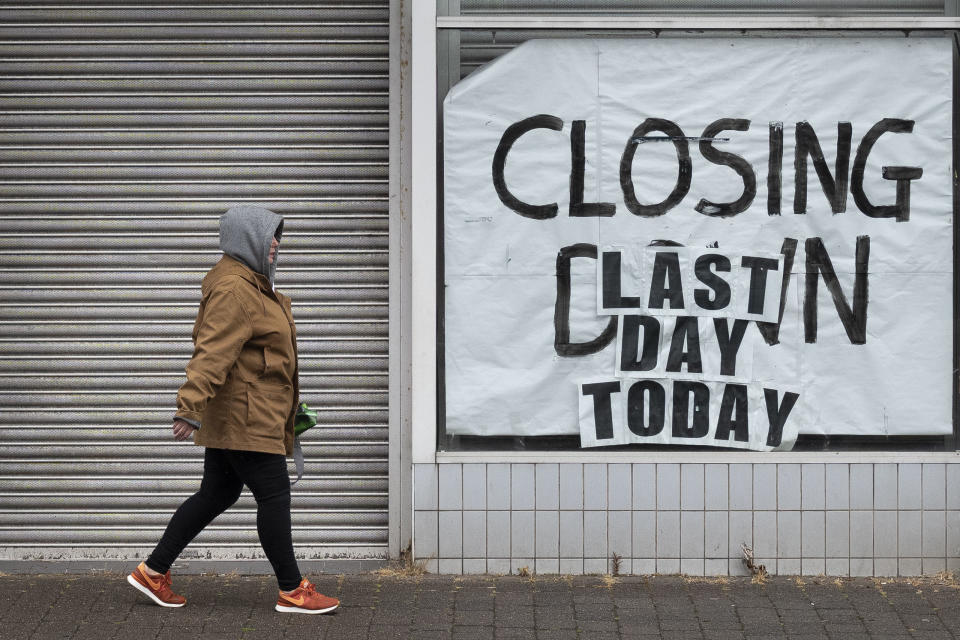3 million UK jobs at risk from £35bn of unsustainable COVID-19 debt

A quarter of a million companies are at risk of collapsing under £35bn ($44bn) of unsustainable debt taken on during the COVID-19 pandemic, according to a new report, putting up to three million UK jobs at risk.
Banking lobby group TheCityUK and consultants EY on Thursday published a 144-page report analysing the financial challenges facing British businesses in the wake of the COVID-19 pandemic.
The report, titled “Recapitalising Businesses post COVID-19,” warns that around 780,000 businesses, most outside of London, have taken on a combined £35bn of debt that is unsustainable, meaning businesses will be unlikely to keep up repayments at the currently agreed level.
READ MORE: 1.4 million on furlough may not get jobs back
The analysis suggests many of these firms could collapse without a coordinated response, putting three million jobs at risk.
Corporate collapse on this scale would incur billions of pounds in costs to the taxpayer, as the government has provided partial or total state guarantees on the private sector loans.
“With tough trading conditions forecast to remain, paying back these loans will be challenging for many SMEs,” Sir Adrian Montague, chairman of TheCityUK Leadership Council, said in a statement. “To secure a strong recovery, action must be taken now to help them sustainably retrench, rebuild and return to growth.”

The government launched a programme of state-backed loans in March to help support businesses through the COVID-19 lockdown. Some 1.1 million businesses across the UK have so far borrowed £46bn through programmes such as the coronavirus business interruption loan scheme (CBILS) and the Bounce Back Loan scheme.
Sir Montague said the programmes had been “the essential sandbags holding back the flood, protecting businesses and saving jobs” but warned that urgent action was needed to stop this debt sinking firms in the coming months.
Read more: UK chancellor unveils £30bn plan to protect millions of jobs
The Office for Budget Responsibility (OBR) this week warned that the UK is facing its sharpest economic downturn in 300 years, meaning many firms will likely not be in a position to begin servicing their debt by early next year.
“COVID-19 is a 100-year storm which has caused untold economic damage,” he said. “Failure to act decisively now will condemn many SMEs and communities across the nation to default and decline.”

The report calls for the government to set up a new “UK Recovery Corporation” that would hold and manage Britain’s COVID-19 corporate debt, helping small businesses to restructure loans they have taken on.
Suggestions for how debt could be managed include student-loan style repayment through the tax system and based on how much revenue a company was earning. For bigger firms, debt could be converted into shares that pay out dividends ahead of other investors.
Government action is necessary, the report says, because of a “fundamental mismatch between the scale of the problem and the quantum of capital that is plausibly likely to be found from private sector sources.” Debt will also be difficult to renegotiate given investors will lose a state guarantee on any new loans issued, making the terms far less attractive.
The report points to the creation of UK Asset Resolution in the wake of the 2008 financial crisis as precedent for the creation of a UK Recovery Corporation. UK Asset Resolution was created to manage and sell down the government’s stakes in British banks after they were bailed out during the crisis.
READ MORE: UK faces worst downturn in 300 years, OBR warns
Action is needed soon, with the first repayments on loans due to begin in March 2021. £30bn of VAT payments have also been deferred and will need to be repaid on a similar timescale.
“Over the next few months, as the government furlough scheme starts to taper off, deferred rent and VAT payments become due, and operating losses continue to accumulate, hundreds of thousands of businesses across the UK will face difficulties repaying the debt they have built up during the pandemic,” said Omar Ali, UK Financial Services Managing Partner at EY, who coordinated the report.
“Our analysis suggests that some sectors may enter into difficulty as early as autumn this year. That is why taking action now is vital if we are to help businesses get back onto a stable footing as we emerge from the pandemic.”
READ MORE: UK chancellor warns of 'difficult' choices on public finances
TheCityUK and EY’s suggestions were endorsed by leading business groups including the Confederation of British Industry (CBI), the British Chamber of Commerce (BCC), and the Federation of Small Business (FSB).
Bim Afolami MP, chair of the All Party Parliamentary Group on Financial Marketing and Services, and Kevin Hollinrake MP, co-chair of the All Party Parliamentary Group on Fair Business Banking, also both endorsed the report.
“Recapitalising SME businesses – the backbone of the UK economy – will be a key piece in the puzzle to getting communities in all parts of the UK back on their feet,” Afolami wrote in the report.

 Yahoo Finance
Yahoo Finance 